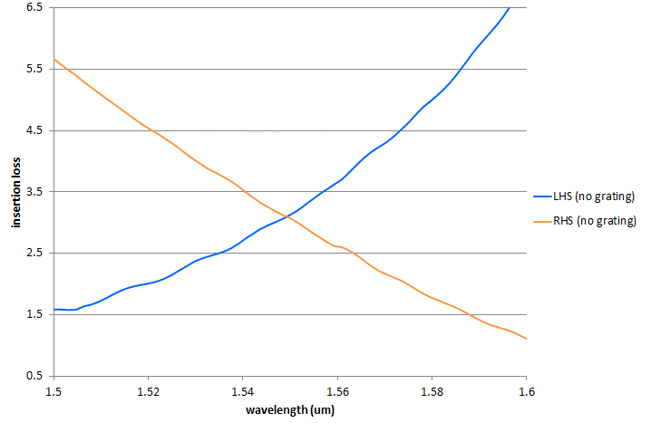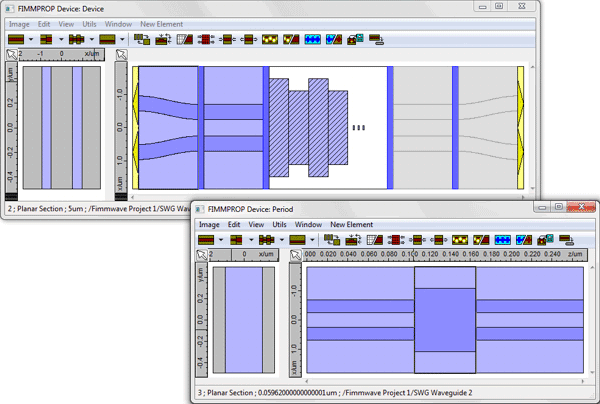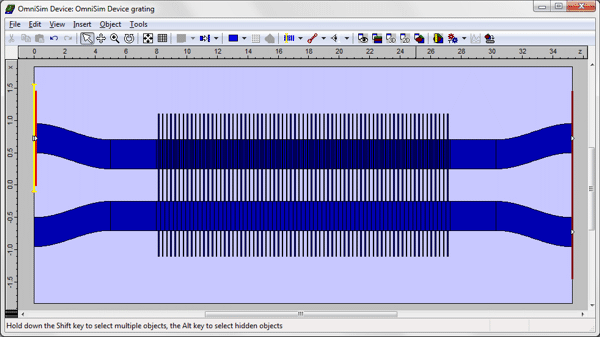OmniSimOmni-directional photonic simulations |
    |
Grating-assisted colourless directional couplerSoftware simulation using OmniSim's FEFD and FDTD Engines and FIMMPROPThis design won the Best Innovation Design competition of the 2012 Group IV Photonics conference, sponsored by Photon Design. OmniSim's FEFD and FDTD engines and FIMMPROP were used to simulate the spectral response of a novel design of power coupler able to operate over a 100nm bandwidth, a much larger spectral range than conventional directional couplers. This design, relying on the use of a dispersion compensating grating, was published by Robert Halir et al. [1] at the University of Malaga, and won the Best Innovation Design competition of the 2012 Group IV Photonics conference, sponsored by Photon Design.
The idea behind the design is the following: the bandwidth of directional couplers is limited by the modal dispersion, which results in strong variations of the ideal length of the coupler with wavelength. A standard evolution of coupler efficiency with wavelength can be seen in the plot below. This plot was obtained with FIMMPROP, with a simulation time of 25s for 64 points.
Halir et al. used a sub-wavelength (lossless) grating to compensate for the modal dispersion. A picture of the design with and without the grating is show below. The grating pitch, duty cycle and the gap between the waveguides were optimised to obtain a 50/50 power splitter over the widest possible bandwidth. The structure was modelled in 2D using FIMMWAVE's propagation tool FIMMPROP, as well as OmniSim's FEFD and FDTD engines. The three methods were found to be in excellent agreement with the published results and with one another. The structure is shown below designed in FIMMPROP (top left). Note that the grey sections are references to the other sections; in particular the tapered region only needs to be modelled once, speeding up calculation time considerably. The central section is a periodic section, which uses the component showed underneath as a period.
The structure is shown below designed in OmniSim. The periodic section is designed by repeating a sub-device periodically.
You can see the spectral evolution of transmitted power for the FIMMPROP and FDTD results in the plot below. The grating design offers an excellent splitting ratio over a much larger range of wavelength, providing the component with a much better bandwidth than the conventional directional coupler. In addition, the grating allows us to strongly reduce the size of the directional coupler and the footprint of the component: without grating, the optimal length of the coupler would be 108um, whilst the grating allows us to reduce the length of the coupling region to ~25um.
Simulation time: 12.5s per wavelength for FIMMPROP (300 modes) i.e. 13 mins for 64 points, 18 mins for the FDTD calculation (10nm grid) on the same computer. References[1] R. Halir, A. Maese-Novo, A. Ortega-Moñux, I. Molina-Fernández, J. G.Wangüemert-Pérez, P. Cheben, D.-X. Xu, J. H. Schmid and S. Janz, "Colorless directional coupler with dispersion engineered sub-wavelength structure", Optics Express, 20, 12, pp. 13470-13477 (2012)
|








